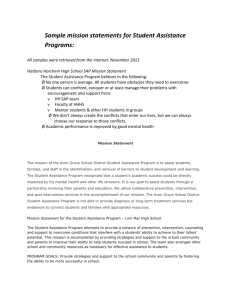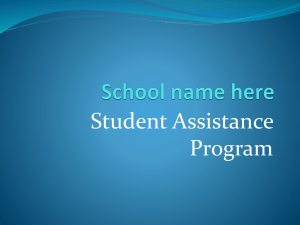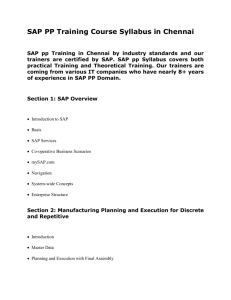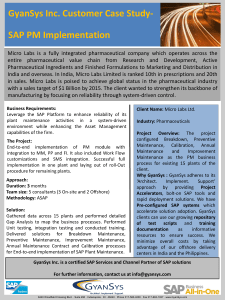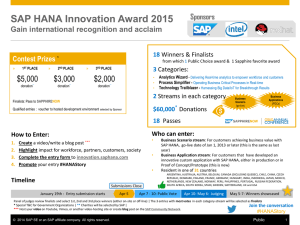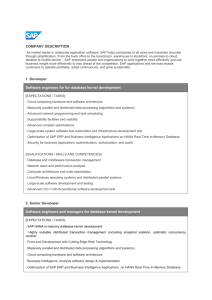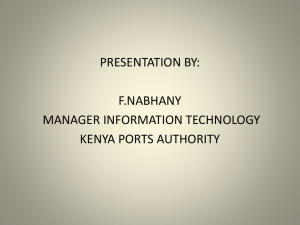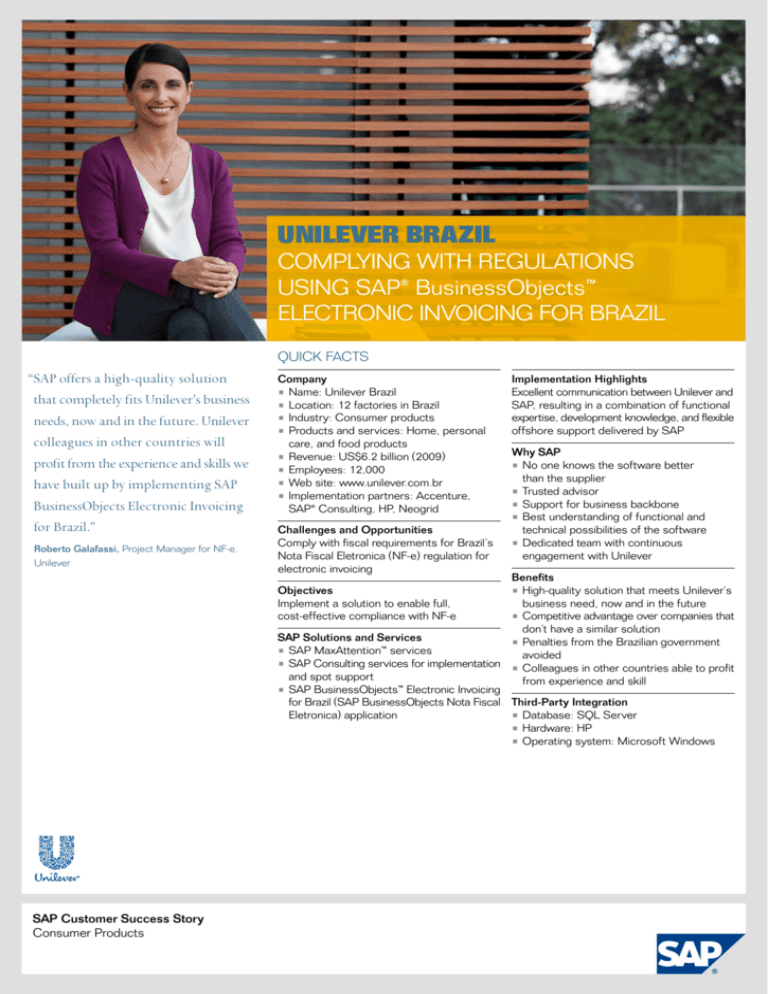
Unilever Brazil
Complying with Regulations
Using SAP® BusinessObjects™
Electronic Invoicing for Brazil
Quick facts
“SAP offers a high-quality solution
that completely fits Unilever’s business
needs, now and in the future. Unilever
colleagues in other countries will
profit from the experience and skills we
have built up by implementing SAP
BusinessObjects Electronic Invoicing
for Brazil.”
Roberto Galafassi, Project Manager for NF-e,
Unilever
Company
•Name: Unilever Brazil
•Location: 12 factories in Brazil
•Industry: Consumer products
•Products and services: Home, personal
care, and food products
•Revenue: US$6.2 billion (2009)
•Employees: 12,000
•Web site: www.unilever.com.br
•Implementation partners: Accenture,
SAP® Consulting, HP, Neogrid
Challenges and Opportunities
Comply with fiscal requirements for Brazil’s
Nota Fiscal Eletronica (NF-e) regulation for
electronic invoicing
Implementation Highlights
Excellent communication between Unilever and
SAP, resulting in a combination of functional
expertise, development knowledge, and flexible
offshore support delivered by SAP
Why SAP
•No one knows the software better
than the supplier
• Trusted advisor
• Support for business backbone
• Best understanding of functional and
technical possibilities of the software
• Dedicated team with continuous
engagement with Unilever
Benefits
•High-quality solution that meets Unilever’s
business need, now and in the future
•Competitive advantage over companies that
don’t have a similar solution
SAP Solutions and Services
•Penalties from the Brazilian government
•SAP MaxAttention™ services
avoided
•SAP Consulting services for implementation •Colleagues in other countries able to profit
and spot support
from experience and skill
•SAP BusinessObjects™ Electronic Invoicing
for Brazil (SAP BusinessObjects Nota Fiscal Third-Party Integration
Eletronica) application
•Database: SQL Server
•Hardware: HP
•Operating system: Microsoft Windows
Objectives
Implement a solution to enable full,
cost-effective compliance with NF-e
SAP Customer Success Story
Consumer Products
Unilever brands are part of everyday life. With 400 brands spanning
14 categories of home, personal care, and food products, no other
company touches so many people’s lives in so many different ways.
In 2009 new government regulations required the company to update the
SAP® ERP application to meet the Brazilian government’s requirement
for electronic invoicing. SAP Consulting assisted Unilever Brazil with
the implementation of the SAP BusinessObjects™ Electronic Invoicing
for Brazil (SAP BusinessObjects Nota Fiscal Eletronica) application.
Replacing Hard-Copy Documents
with Electronic Versions
Today Brazil has the most advanced
(and certainly the most stringent) set of
requirements in global e-invoicing – known
as Nota Fiscal Eletronica (NF-e). Unlike
some EU countries, which in most cases
still allow unsigned business-to-business
transactions between parties, Brazil
imposes a defined electronic standard
format that all companies must adhere to.
The NF-e requirements will gradually
replace conventional hard-copy invoices
with electronic counterparts that must be
digitally signed and shaped into a particular government-specified XML format. This
new XML invoice is integrated into daily
business operations. For example, before
goods can be released for movement to
a location outside the current premises
(either at Unilever or a third party), the
XML file must first be transmitted to the
state ministry of finance for review and
approval. Once approved, the official file
is transmitted back to the company for
archiving (up to five years). Then when the
invoice is actually generated, a copy of
the XML version is posted in a site where
all customers can access it.
Finally, a copy of the XML invoice must
also be converted into a human readable format, which must be printed and
carried as part of the documentation pack
accompanying the shipment. At any point
along the way, the truck can be pulled
aside by police or customs officials, who
will scan the bar code on the printed document to validate that the goods’ movement
has been sanctioned by the government.
There are additional responsibilities and
requirements at the receiver’s end as well.
Since most ERP warehouse and logistics
systems were obviously not designed for
such an extensive regulation, there is a
huge need for companies in Brazil to find
add-ons or extensions to their IT systems
to handle these requirements. To avoid
excessive delays, these systems must
work in real time as nearly as possible, and
they must provide for smooth data entry.
Meeting the New Government
Requirements
Unilever Brazil uses SAP ERP for most
of its primary processes. So to comply
with NF-e requirements, Unilever contracted SAP MaxAttention™ services. SAP
Consulting and SAP partner Accenture
assisted in the implementation of SAP
BusinessObjects Electronic Invoicing for
Brazil. SAP Consulting also delivered
spot support.
Roberto Galafassi, project manager for
NF-e at Unilever in Brazil, describes the
specific project objective: “Due to the new
regulations, all sales must be previously
approved by the Brazilian government.
The government uses our billing documents to analyze whether our customers
are registered in its fiscal systems and
also if the nota fiscal or billing document
is legally correct and represents sales
properly.”
SAP Software Supports Compliance
SAP BusinessObjects Electronic Invoicing
for Brazil eliminates duty misappropriation
and validates that fiscal information in sales
correctly reflects operations. It supports
Unilever operations’ automatic compliance
with governmental demands. Checks are
done in an automated workflow. During
the invoicing process, information is validated as required by the government.
After that, an electronic version is made,
at which time the data is completely
“closed” and cannot be changed further
by Unilever. The information is sent to the
government, where staff members analyze
“Our decision to work with SAP
was based on the idea that nobody
knows the software better than
the supplier.”
Roberto Galafassi, Project Manager
for NF-e, Unilever
the data and make several additional validations. At this stage, any incorrect data
is identified and corrected. Then the government either approves or disapproves
the billing document. If the document is
approved, SAP BusinessObjects Electronic Invoicing for Brazil automatically
sends a trigger to SAP ERP, and the billing document can be printed. The truck
with the goods is sent to the customer,
and products mentioned in the invoice are
delivered.
Galafassi underscores the importance of
the new solution: “Every supplier must
provide this electronic file to customers,
and the file has legal value. So nowadays
for Unilever, SAP BusinessObjects Electronic Invoicing for Brazil is really a must
for doing business in Brazil.”
Implementation Based on Best
Practices
To be sure that the plan preparation for
and implementation of the application was
based on best practices, Unilever decided
to collaborate with SAP Consulting and
Accenture. Galafassi says, “Accenture
is the continuing implementation and
development partner hired by Unilever.
The consultants have a lot of knowledge
about integrating our systems with
SAP solutions and best practices in our
industry.”
Denis Torii, manager at Accenture,
further explains, “By using our previous
experiences with SAP on NF-e projects,
and the longtime relationship with SAP, we
supported Unilever in the implementation
of SAP BusinessObjects Electronic
Invoicing for Brazil. The implementation
was achieved by the required due date.
Certainly, the best practices supported
by SAP and Accenture were key to this
implementation.”
“Our decision to work with SAP was
based on the idea that nobody knows
the software better than the supplier.”
says Galafassi. “We use a standard
SAP solution for the data process formatting, electronic subscription, and
government dispatch. The advantage of
SAP Consulting to install the software
and HP to install all required hardware.
Galafassi is sure this collaboration of two
reputable technical suppliers has simplified all implementation processes substantially. He comments, “SAP and HP
have joined efforts to solve problems when
they appeared.”
It took one year to complete the full project, including the preparation. SAP Consulting was only needed for five months.
Unilever’s costs included seven new servers, more than 120 programs that had to
“The advantage of SAP BusinessObjects Electronic Invoicing for Brazil is that all
data preparation can be done in SAP ERP. . . . This way SAP can create appropriate
documentation to support Unilever in the future with reinstallations, known
bugs, and knowledge transfers.”
Roberto Galafassi, Project Manager for NF-e, Unilever
SAP BusinessObjects Electronic Invoicing
for Brazil is that all data preparation can be
done in SAP ERP, or can be applied using
corrective notes from the SAP Notes tool.
We choose to use a standard solution,
even if it’s necessary to apply a large
number of corrective notes. This way
SAP can create appropriate documentation to support Unilever in the future
with reinstallations, known bugs, and
knowledge transfers. So this is a very
future-proof solution.”
Issues Solved Promptly
To help prevent any technical issues
during implementation, Unilever hired
be modified, the SAP BusinessObjects
application, applying almost 500 corrective notes, adjustments to noncore legacy
systems and management information
systems, and 128 new printers. There was
no business case developed, according
to Galafassi, because the ROI for Unilever
can hardly be calculated. “It’s quite simple:
this investment was inevitable,” he says.
“Otherwise, in the near future we wouldn’t
be compliant anymore.”
Lessons Learned
The implementation has given Unilever
much experience for future rollouts.
Galafassi sums up the lessons learned:
www.sap.com /contactsap
“It’s really important to improve test quantity, looking for more trustworthy case
examples. During the parallel test period,
follow up and validate the current operation. And last but not least, it’s good to
schedule more days to get the system
more stable during the go-live period. This
is necessary to correct possible errors,
avoiding stress on sales and production
operations.”
Unilever has documented and tested
the new SAP BusinessObjects Electronic
Invoicing for Brazil application thoroughly
so it can be used as a future guideline
for other country offices that may be confronted with similar regulations. Galafassi
notes: “This way our specialists can
support other offices. They can advise
about specific questions regarding customization and improvements and suggest standard procedures according
to SAP policy. We can also support
the implementation of SAP MaxAttention
recommendations for improving system
performance and mitigating technical
risks.”
A High-Quality Solution
Since Unilever’s ERP systems now
comply with Brazil’s strict requirements for
electronic bills of invoicing, the company
avoids penalties and fines. This means
Unilever has a competitive advantage
over other companies that aren’t yet compliant. Galafassi sums up: “SAP offers a
high-quality solution that completely fits
Unilever’s business needs, now and in
the future. Unilever colleagues in other
countries will profit from the experience
and skills we have built up by implementing SAP BusinessObjects Electronic
Invoicing for Brazil.”
50 105 923 (11/08)
©2011 SAP AG. All rights reserved.
SAP, R/3, SAP NetWeaver, Duet, PartnerEdge, ByDesign,
SAP BusinessObjects Explorer, StreamWork, and other SAP products
and services mentioned herein as well as their respective logos are
trademarks or registered trademarks of SAP AG in Germany and
other countries.
Business Objects and the Business Objects logo, BusinessObjects,
Crystal Reports, Crystal Decisions, Web Intelligence, Xcelsius, and
other Business Objects products and services mentioned herein
as well as their respective logos are trademarks or registered trade­
marks of Business Objects Software Ltd. Business Objects is an
SAP company.
Sybase and Adaptive Server, iAnywhere, Sybase 365, SQL Anywhere,
and other Sybase products and services mentioned herein as well
as their respective logos are trademarks or registered trademarks of
Sybase, Inc. Sybase is an SAP company.
All other product and service names mentioned are the trademarks of
their respective companies. Data contained in this document serves
informational purposes only. National product specifications may vary.
These materials are subject to change without notice. These materials
are provided by SAP AG and its affiliated companies (“SAP Group”)
for informational purposes only, without representation or warranty of
any kind, and SAP Group shall not be liable for errors or omissions
with respect to the materials. The only warranties for SAP Group
products and services are those that are set forth in the express
warranty statements accompanying such products and services, if
any. Nothing herein should be construed as constituting an additional
warranty.



